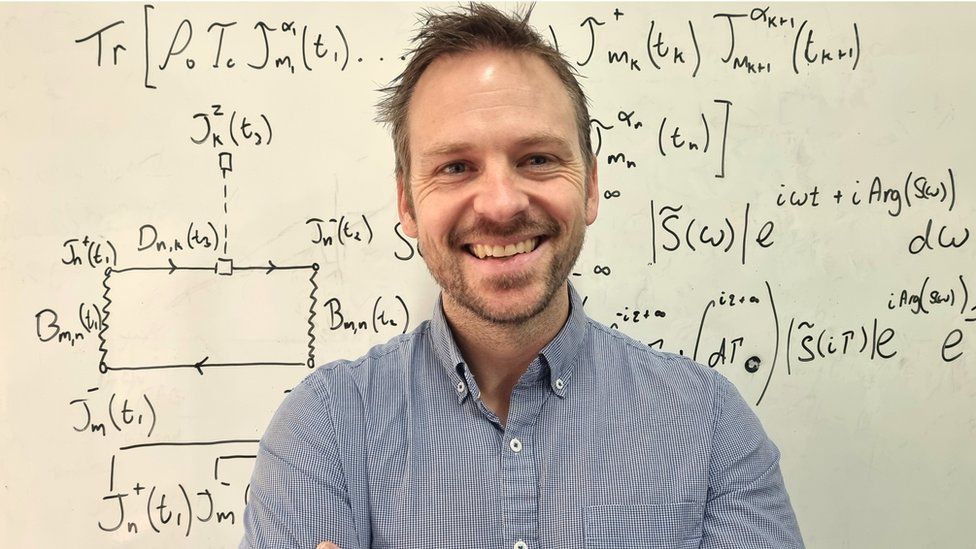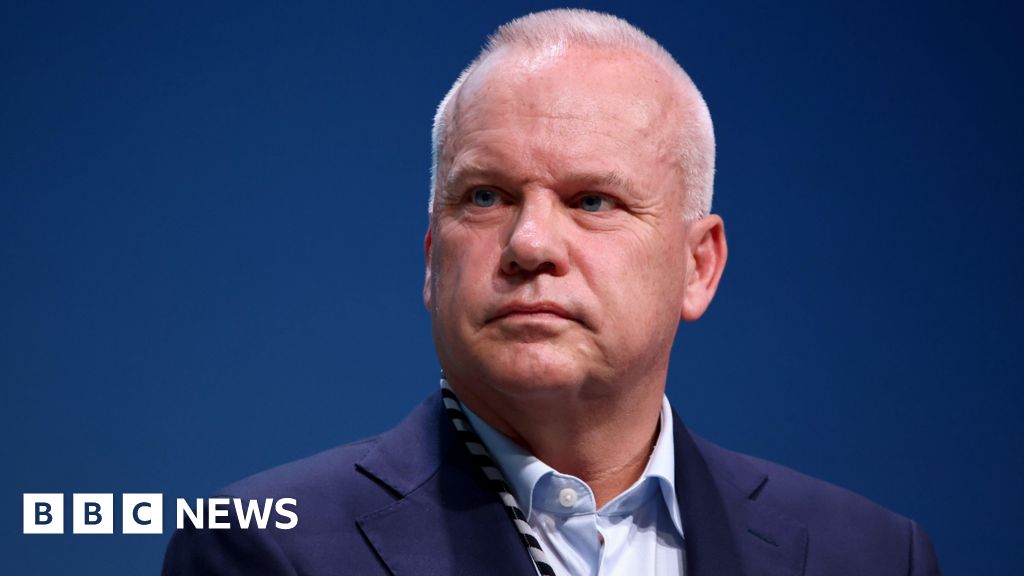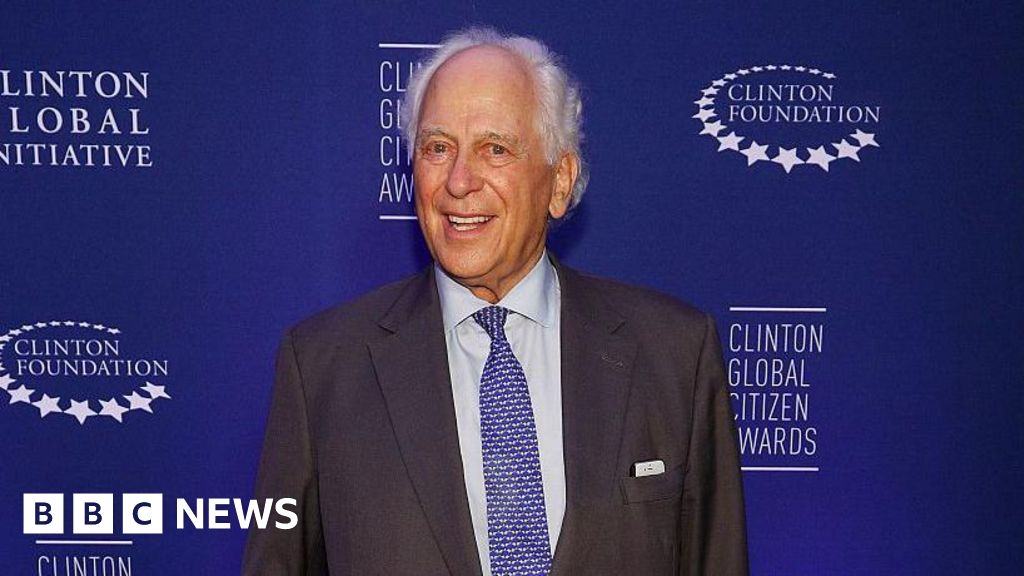 Image source, CSIRO
Image source, CSIRO
Liam Hall's career has taken him from diesel mechanic to quantum biotechnology
By Phil Mercer
BBC, Sydney
Growing up on a farm in Australia, Liam Hall was a mechanic "getting greasy, scraped knuckles", but in recent years his career has taken a more technical turn.
He's now the head of quantum biotechnology at CSIRO, Australia's national science agency.
"I've got a bit of a weird background. I always wanted to be a diesel mechanic. Doing that for a while led to wanting to do engineering at university. That introduced me to the physics, and then to the quantum physics. A rollercoaster ride is a good way to describe it," he says.
His team has been developing diagnostic technologies, experimenting with micro sensors crafted from tiny slivers of diamonds about 50 nanometers in size (about 1,000 times finer than human hair) to test patients' iron levels.
Current methods monitor a protein known as ferritin, the body's iron storage mechanism. While monitoring ferritin is a good way to measure iron, it would be more accurate to measure the actual iron levels inside the protein.
One way to do that would be to measure the tiny magnetic fields generated by the iron. But there's one big problem with that approach.
"[The magnetic field] is completely tiny and outside the measurement of any traditional magnetometers or microscopes," explains Dr Hall.
However, Dr Hall's nano-scale quantum sensors can detect those tiny fields and measure them.
He says in the future, the technology could develop an early flag for any particular disease, including the surveillance of certain hormones or proteins that might indicate cancer.
"The advantage for quantum systems has always been that you can achieve much, much better sensitivity and easier identification of chemicals at a much lower cost," Dr Hall says.
Image source, University of Chicago
Image caption,Researchers across the world are working on quantum technologies
Dr Hall is part of a global push to develop quantum technologies. Britain, China, the US and countries elsewhere, are all trying to exploit the weird properties of quantum mechanics.
"Quantum is one of Australia's most promising growth opportunities - a chance to create new markets, new applications," said CSIRO's chief scientist, Prof Bronwyn Fox.
Quantum mechanics emerged in the early 20th Century from studies of nature's smallest objects. Scientists believe it has the potential to expand our understanding of the universe and solve complex problems at lightning speeds.
The range of applications appears vast; from advances in environmental science and decarbonisation, to cyber-security and new medicines. There could be molecules that "eat up carbon" and remove it from the atmosphere, quantum batteries to power cars, aircraft that are designed to lower their emissions and transport logistics to reduce road congestion.
One ambition of quantum research is to harness the power of sub-atomic particles to store and process data.
While conventional computing generally uses bits (zeroes and ones), quantum computers use qubits, which can exist as zeroes, ones, or combinations of both at once.
This is where things can get a bit strange, where particles can exist in multiple states simultaneously (this is called superposition), and also be intertwined (or entangled) with each other.
"Using that principle of quantum superposition together with another quantum phenomenon known as entanglement, it enables you to perform calculations that are simply impossible using conventional computers. It opens up the possibility of doing some quite amazing calculations that can be world changing," explains Prof Andrew Dzurak from the University of New South Wales.
"Imagine a new branch of Covid or another horrible pandemic. Once you understand the molecular structure of that, which can be done using standard experimental techniques, you then go to the quantum computer and you calculate how to make a molecule that specifically attacks that virus.
"You solve that problem in a day rather than in the six or nine months that it took all of the greatest biological and pharmaceutical minds on the planet to come up with the vaccines for Covid."
The power driving quantum computing comes from entanglement, a natural phenomena, according to Dr Mohammed Usman, a team leader at Data 61, a business within CSIRO.
It's complex and not easy to grasp. Special particles, often photons, or flecks of light, can be in two places at the same time, but remain strongly connected even though they are not physically linked.
"I would say that nobody in the world fully understands the basics of entanglement," is Dr Usman's honest assessment.
Could there be a quantum internet? Quite possibly. Data might be despatched through optical fibres using particles of light making it almost impossible to be eavesdropped or hacked.
Image source, University of Chicago
Image caption,Prof David Awschalom has built a 200km quantum network at Chicago's Pritzker School of Molecular Engineering
In the US, the University of Chicago has built one of the country's longest quantum networks. It is almost 200km (124 miles) long and growing.
David Awschalom is the Liew Family Professor of Molecular Engineering and Physics at the University of Chicago's Pritzker School of Molecular Engineering. He's also the founding director of the university's Bloch Quantum Tech Hub, which expects to create 30,000 quantum jobs by 2035 and generate $60bn for the economy. It's a collaboration with experts in Australia, India, Japan, the Netherlands and Israel.
"We've extended how far we can send secure quantum messages through many miles of underground fiber," he explains.
"But there are significant challenges to overcome. With quantum computing, for instance, we are working on maintaining quantum coherence, which means keeping a quantum system intact; error correction, which means detecting and correcting errors caused by decoherence; and scalability, which means being able to increase the number of qubits in a quantum system to solve more complex problems."
Image source, Getty Images
Image caption,Quantum computers promise to solve problems that traditional computer are not suited to
Years of painstaking research lie ahead, but the future appears to hurtling quickly towards us.
"Quantum artificial intelligence is one of the key areas of research in our team. Machine learning and artificial intelligence is very computationally intensive and quantum computing promises computational power," explains Dr Usman from CSIRO.
"For example, self-driving cars or drones flying in battlefields with lethal weapons. Can we trust artificial intelligence? So, what we have found is that integrating quantum computing in artificial intelligence leads to very reliable and trustworthy systems," he said.
"My dream come true would be that large-scale quantum computers are available and we can run quantum algorithms that I am developing to find solutions to the problems that we haven't found yet, and that will revolutionise everything."

 9 months ago
52
9 months ago
52









